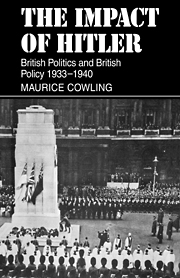Book contents
- Frontmatter
- Contents
- Preface
- Dedication
- Introduction
- PROLOGUE: THE UNFOLDING OF THE PROBLEM
- PART I THE NEW DEPARTURE
- PART II THE OPPOSITION
- PART III THE EFFECT
- Halifax
- Chamberlain, Churchill and Hitler
- The declaration of war
- PART IV THE POLITICS OF EASY VICTORY
- Conclusion
- Appendix: the actors
- Bibliography
- Notes
- Index
The declaration of war
Published online by Cambridge University Press: 19 October 2009
- Frontmatter
- Contents
- Preface
- Dedication
- Introduction
- PROLOGUE: THE UNFOLDING OF THE PROBLEM
- PART I THE NEW DEPARTURE
- PART II THE OPPOSITION
- PART III THE EFFECT
- Halifax
- Chamberlain, Churchill and Hitler
- The declaration of war
- PART IV THE POLITICS OF EASY VICTORY
- Conclusion
- Appendix: the actors
- Bibliography
- Notes
- Index
Summary
‘Next Thursday Baldwin resigns the Premiership and Neville will become Prime Minister. The latter, two months ago, told me in confidence that he wanted me to succeed him as Chancellor of the Exchequer…I warned him that I had no special knowledge of finance and approached such an office with humbleness’.
Simon diary May 20 1937‘D. Margesson says Simon…hopes he would be considered for the Treasury as if not he would like to consider retiring from politics and writing (all ambitious politicians like to say this at such moments)…He considered his only rival to be Kingsley Wood as Sam [Hoare] had so lost the confidence of the House and country’.
Chamberlain diary February 11 1937‘If only you could succeed Baldwin when the time comes’.
Sir Henry Norman to Simon December 16 1936In the life of his government, the subject Chamberlain had chosen as the demonstration of his will — relations with Hitler and Mussolini — exploded into being the only subject of importance. It so acutely involved every politician's understanding of the future that even the Cabinet felt the impact.
Between May 1937 and the outbreak of war, twenty-nine ministers served in the Cabinet. Of these Lord Stanley was unwell and rather deaf, mattered very little (except as Derby's favourite son) and was a Cabinet minister for only a short time before he died (young) just after Munich. Others also were of little importance without being deaf, or were so dependent or unwilling to chance their arms that they had the status of backbench voyeurs.
- Type
- Chapter
- Information
- The Impact of HitlerBritish Politics and British Policy 1933-1940, pp. 313 - 352Publisher: Cambridge University PressPrint publication year: 1975



